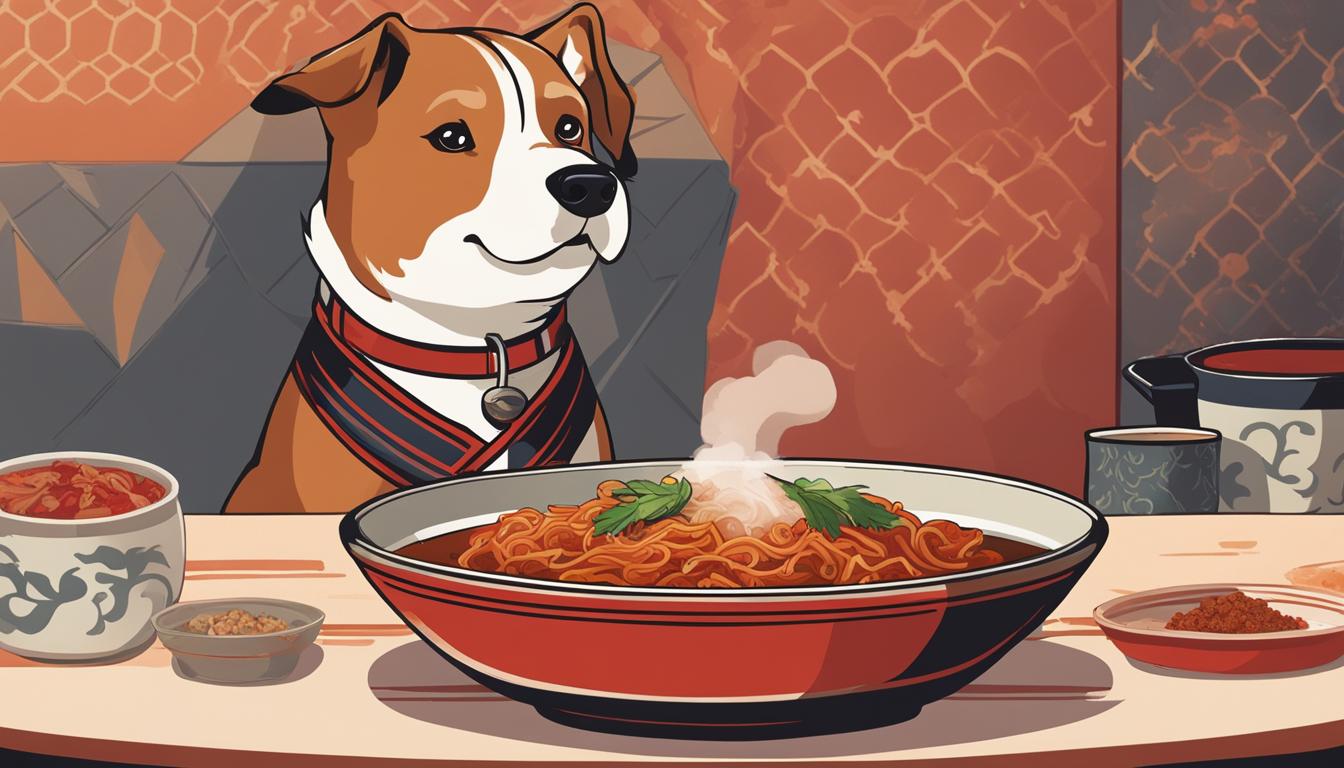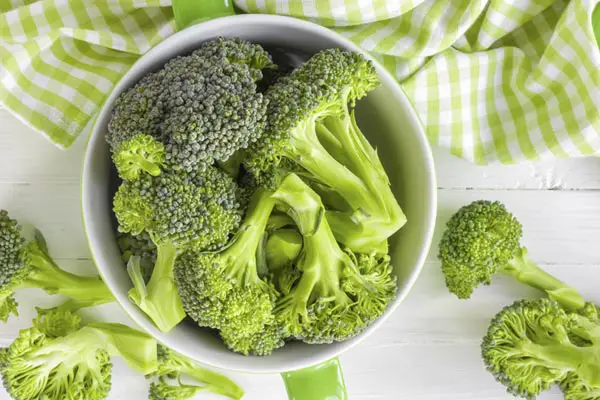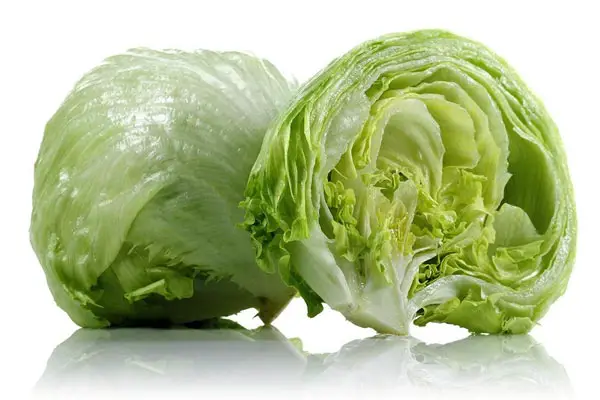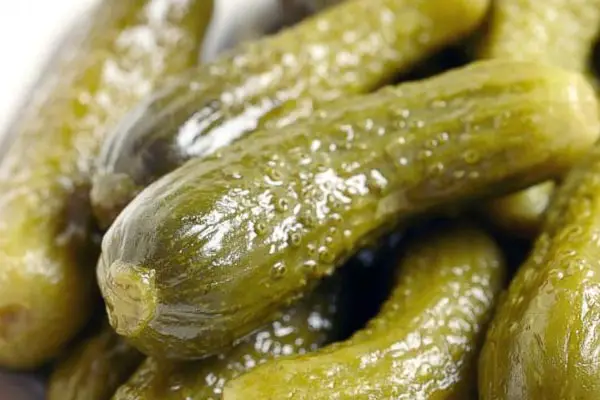Can Dogs Eat Kimchi? – Your Comprehensive Guide
Kimchi is a traditional Korean dish made from fermented vegetables, such as cabbage or Korean radish. It is seasoned with garlic, onion, and red pepper flakes. While kimchi is safe for human consumption and offers various health benefits, it is not recommended as a regular part of a dog’s diet.
Dogs can have a small amount of kimchi without any immediate harm, but the high salt content and certain seasonings can have negative effects on their health, including digestive issues.
Now, let’s explore the details about kimchi and whether it suits dogs.
What is Kimchi?
Kimchi is traditionally prepared by layering the vegetables with the seasonings and allowing them to ferment for several days or weeks. This fermentation process gives kimchi its characteristic sour taste and the distinctive aroma often associated with Korean cuisine. Combining fermented vegetables and seasonings creates a rich and complex flavor profile.
Kimchi is a versatile condiment that can be enjoyed on its own or as an ingredient in various dishes. It adds flavor and texture to rice, noodles, soups, stews, and sandwiches.
Kimchi is an excellent option for those focused on health, as it contains probiotics that are beneficial bacteria for your body. If you want to add good bacteria to your diet, kimchi is a popular and tasty.
Can Dogs Eat Kimchi?
Dogs can eat a small amount of kimchi without immediate harm, but it is not recommended as a regular part of their diet.
While the fermented vegetables in kimchi can provide probiotic benefits, the high salt content and certain seasonings like garlic and onion can harm dogs.
Giving your dog too much salt or feeding them garlic and onion can make them sick. It might lead to problems like sodium ion poisoning, upset stomach, and harm to their red blood cells. It’s best to avoid feeding kimchi to dogs regularly and opt for dog-friendly alternatives instead.
The Risks of Kimchi for Dogs
Kimchi has quite a bit of salt, and dogs are sensitive to salt, which can cause health problems. Dogs can’t handle as much salt as humans, and too much can mess with their electrolytes and overall health.
Some ingredients in kimchi, like garlic and onion, can also upset a dog’s stomach and be harmful if eaten in large amounts.
| Can Dogs Eat Kimchi? | Risks | Recommendations |
|---|---|---|
| Yes, but in small amounts |
|
|
Instead of kimchi, dogs can enjoy safe alternatives that provide similar health benefits. Wholesome vegetables like carrots, green beans, and sweet potatoes are safe for dogs and can be included in their diet. Probiotic supplements designed for dogs can also be beneficial for their digestive health.
Can Dogs Eat Fermented Foods?
Dogs can enjoy certain fermented foods in moderation and benefit from the probiotics they provide. Fermented foods undergo a natural preservation process that involves the action of beneficial bacteria, which can support a healthy digestive system in dogs. However, it is essential to note that not all fermented foods are safe for dogs to consume.
When considering feeding fermented foods to your dog, it is crucial to avoid those that contain toxic ingredients like alcohol or high levels of salt. Dogs have a lower tolerance for salt than humans, and excessive salt intake can lead to health issues such as sodium ion poisoning.
Therefore, it is crucial to be mindful of the salt content in fermented foods before offering them to your furry friend.
The Benefits of Probiotics for Dogs
Probiotics found in fermented foods can have several benefits for dogs. They can help improve digestion, promote a healthy gut flora, and support the immune system. Additionally, probiotics can aid in alleviating specific digestive issues, such as diarrhea or constipation.
When introducing fermented foods into your dog’s diet, it is crucial to do so gradually and in small quantities. This allows their digestive system to adjust to the new food and reduces the risk of adverse reactions. It is also wise to consult your veterinarian to ensure that the specific fermented food you plan to offer is safe and suitable for your dog’s needs.
Safe Alternatives to Kimchi for Dogs
While kimchi may not be suitable for dogs, there are safe alternatives that can provide similar health benefits. It’s important to prioritize a balanced and species-appropriate diet for dogs, incorporating nutritious vegetables and probiotics.
Vegetables: Wholesome vegetables like carrots, green beans, and sweet potatoes can be excellent additions to a dog’s diet. These vegetables are safe for dogs to consume and provide essential nutrients such as vitamins, minerals, and fiber. Depending on your dog’s preferences, they can be served cooked or raw.
Probiotic Supplements: Probiotics can benefit a dog’s digestive health, just as they are for humans. Probiotic supplements are available specifically designed for dogs, which can help maintain a healthy gut flora and support their overall well-being. It’s essential to consult with a veterinarian to determine the appropriate dosage and probiotic for your dog.
| Safe Alternatives to Kimchi for Dogs | Benefits |
|---|---|
| Carrots | Rich in vitamins and fiber |
| Green Beans | Low in calories and high in nutrients |
| Sweet Potatoes | Good source of fiber, vitamins, and antioxidants |
| Probiotic Supplements | Supports digestion and gut health |
How to Prevent Your Dog from Eating Kimchi
Here are a few tips to help you ensure your furry friend doesn’t accidentally consume kimchi:
1. Store Kimchi Safely
One of the key steps in preventing your dog from eating kimchi is to store it securely. Keep kimchi in a sealed container and store it in the refrigerator. This will keep the kimchi fresh and prevent your dog from getting access to it, reducing the risk of ingestion.
2. Teach Good Manners Around Food
Training your dog with commands like “leave it” can be highly beneficial in preventing them from eating off-limits items.
3. Supervise Your Dog
When you’re out with your dog, whether at social events or public places, it’s important to watch them closely to prevent them from accidentally eating something harmful.
Dogs can be curious eaters, so being attentive and observing their behavior will help avoid situations where they might try to taste things like kimchi, which can be risky.
If your dog does happen to ingest kimchi, it’s crucial to monitor their health closely. If you notice any symptoms or concerns, it’s recommended that you contact your veterinarian for guidance and assistance. Stay proactive in keeping your furry friend safe and healthy during your outings.
FAQ
Can dogs eat kimchi?
While dogs can eat a small amount of kimchi without immediate harm, it is not recommended as a regular part of their diet. The high salt content and certain seasonings like garlic and onion can harm dogs. It’s best to avoid feeding kimchi to dogs regularly and opt for dog-friendly alternatives instead.
What is kimchi?
Kimchi is a tasty Korean dish from fermented veggies like cabbage or radish. We add garlic, onion, and red pepper flakes for flavor. It’s fermented with bacteria, like in yogurt and sauerkraut, giving it a tangy taste. Kimchi is not just delicious; it’s good for your gut, too!
Can dogs eat fermented foods?
Dogs can eat certain fermented foods in moderation and enjoy some probiotic benefits. However, not all fermented foods are safe for dogs, especially those that contain toxic ingredients like alcohol or high salt levels.
It’s essential to be mindful of the salt content in fermented foods, as dogs are more sensitive to salt than humans. Consult a veterinarian before introducing new fermented foods to a dog’s diet.
Are there safe alternatives to kimchi for dogs?
Yes, there are safe alternatives that can provide similar health benefits. Wholesome vegetables like carrots, green beans, and sweet potatoes are safe for dogs and provide essential nutrients.
Probiotic supplements designed for dogs can also be beneficial for their digestive health. It’s important to prioritize a balanced and species-appropriate diet for dogs and consult a veterinarian for personalized nutrition advice.
How do I keep my dog from eating kimchi?
To keep your furry friends safe, storing kimchi and other potentially harmful foods in a securely sealed container in the fridge is essential. This prevents dogs from accidentally getting access.
Additionally, training your dogs with commands like “leave it” helps instill good manners around food and keeps them from eating things they shouldn’t.
When taking your dogs to social gatherings or public spaces, be vigilant to make sure they don’t sneak any forbidden treats. If your dog accidentally consumes kimchi, keep a close eye on their health. If any symptoms or issues arise, it’s essential to contact a veterinarian for guidance promptly.






